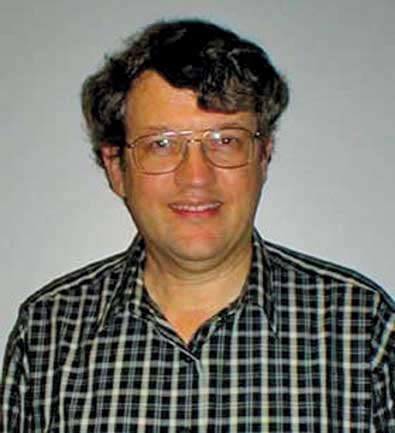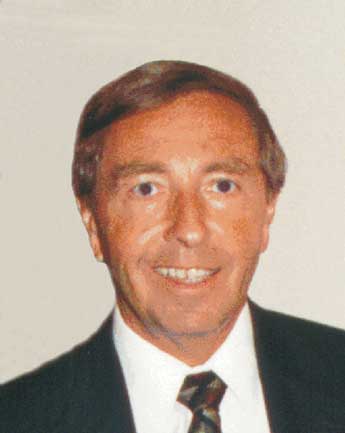 The
EMC personality that is profiled in this issue of the IEEE EMC
Newsletter is Dr. Thomas (Tom) Jerse. Tom works full time as an
Associate Professor of Electrical and Computer Engineering at
The Citadel in Charleston, South Carolina, USA. He is also an
Associate Technical Fellow of the Boeing Company and he works
part time for Boeing, primarily by telecommuting at least one
day a week during the school year and more frequently during the
summer.
The
EMC personality that is profiled in this issue of the IEEE EMC
Newsletter is Dr. Thomas (Tom) Jerse. Tom works full time as an
Associate Professor of Electrical and Computer Engineering at
The Citadel in Charleston, South Carolina, USA. He is also an
Associate Technical Fellow of the Boeing Company and he works
part time for Boeing, primarily by telecommuting at least one
day a week during the school year and more frequently during the
summer.
Tom received a BSEE Degree from the University of New Mexico in
1973, a MSEE from Stanford University in 1975, and a PhD degree
from the University of Kentucky in 1994. Tom had always admired
the work of Clayton Paul so when he decided to go for his PhD
degree, he contacted Clayton who graciously took him on as a PhD
student and Tom spent three enjoyable years earning his degree.
Clayton has certainly had a positive influence on a number of
students.
While earning his undergraduate degree, Tom worked for five years
as a broadcast engineer at WTWO-TV Terre Haute and KOB-TV Albuquerque.
Tom’s EMC experience began when he was working in TV stations.
It did not take long to realize that cables had non-ideal properties
that required careful application of the proper techniques for
grounding and bonding.
After receiving his BSEE, Tom worked for ten years for Hewlett-Packard
(HP) in their Signal Analysis Division in Santa Rosa, California.
During his first six years with HP he was a microwave/RF circuit
designer and he designed the front end of the HP8568A spectrum
analyzer. Then he became an R&D Project Manager and was the
principal system architect of the HP8562 family of portable spectrum
analyzers.
Working on HP spectrum analyzers where spurious responses that
are over 100 dB below the fundamental response can be viewed on
the screen of the instrument, Tom quickly learned the techniques
of EMI control and started consulting on other projects within
HP. As many before him, he discovered the time honored truth that
the later in the product development that EMI fixes are applied,
the less cost-effective the EMI fixes were likely to be.
In order to have EMI considered earlier in the design and development
of products, Tom developed a half day in-house course, “Designing
for EMC,” that he taught at many HP Divisions. While on
the HP faculty loan program to the University of California at
Davis in 1987, Tom developed a full-term EMC course. The next
year, it was transformed into a two day comprehensive course that
was offered to customers around the world.
Tom found teaching to be so enjoyable that when he was turning
40, he decided that if he was ever going to be a professor, this
was the time to go back to school or it was not going to happen.
His wife was very supportive and with Clayton’s assistance
and a lot of hard work, he earned a PhD. While he was working
on his PhD, he continued to teach his EMC course for HP from time
to time.
After earning his PhD, Tom accepted a position at The Citadel,
Clayton’s alma mater, where he teaches courses on electromagnetics,
EMC, circuits and electronics and performs research on common-mode
emission modeling.
Tom’s other academic employment has included spending a
year as an Assistant Professor of Music at Brooklyn College of
the City University of New York where he taught computer music
and set up a computer music laboratory. He also taught graduate
courses in microwave circuit design and a mezzanine course in
EMC at the University of California at Davis.
In 1997, Tom accepted a full time position with Boeing, in Seattle,
performing RF and EMC work for a variety of programs, but he missed
teaching. Fortunately, he was able to work out his current situation
where he can teach and still keep current by working on advanced
projects.
Tom is a long time member of the EMC Society. He won the first
President’s Memorial Award in 1992. He received the EMC
Society University Grant in 2003 and has been the Chairman of
the University Grant committee from 2006 to the present. Tom is
the Co-chair of the Technical Program Committee for the 2008 IEEE
International Symposium on EMC in Detroit.
Tom spent two years as an EMC Society Distinguished Lecturer.
He spoke at ten Chapters and greatly enjoyed talking to other
EMC engineers to learn about new problems and new points of view.
During his spare time, Tom enjoys gardening and growing roses.
He also enjoys music, playing the piano, harp, trombone, recorder,
and bowed psaltery. He has played in dance bands, brass quintets,
Dixieland bands, concert bands, amateur symphonies, weddings and
coffee houses.
Tom is married and his wife Christine has been very supportive
of him and his career. They have one grown son. EMC
 EMC
Personality Profile
EMC
Personality Profile